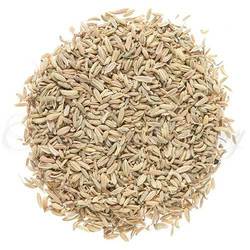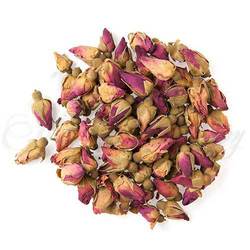Herbal Tea to the Rescue!
Posted by Selina Law on Nov 12th 2017
Last November we talked about which types of “real/true” tea (Camellia Sinensis), in general, are better for our body in the cold weather—mainly the “higher oxidized” teas such as oolong, black and pu-erh. This time, we are going to talk about herbal tea/infusion/tisane.
Herbal tea is not considered to be “real/true” tea, as it does not come from the Camellia Sinensis plant. It is an infusion of leaves, fruits, bark, roots or flowers of almost any edible “non-tea” plant. Some people refer to it as “tisane”, though this term is not that common in the United States.
For thousands of years, herbs have been consumed for both medicinal reasons and culinary enjoyments in many cultures. Some of the earliest written records of these practices are found in the Ancient Egyptian Ebers Papyrus , dating from the 16th century B.C. The Old Testament of the Bible mentions the use of plants such as aloe, cinnamon, hyssop, saffron and many more others. Chinese emperor, Shennong, who is believed to have discovered Camellia Sinensis around 2737 B.C., had extensive knowledge of herbs. It is said that he acquired such knowledge by tasting the herbs in order to distinguish those with medicinal values from the poisonous ones.
This system of using herbs to support a healthy mind and body continues today. Herbs work internally to regulate and balance the body’s vital energy. They can be consumed in various forms, but many people believe that boiling raw herbs into a tea offers the most beneficial effects.
Most herbal teas are naturally caffeine free. Here are some herbal teas that are deemed to be especially good for the cold seasons:
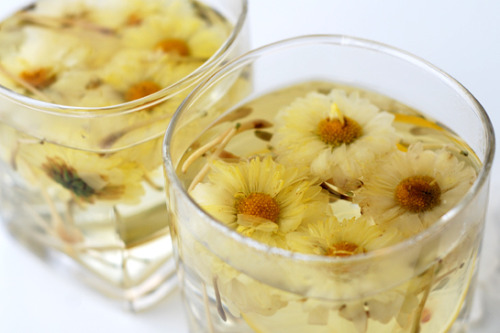
Chrysanthemum—In autumn’s dry climate, it is common for us to have dry eyes, especially for students and people who work in front of a computer for long hours. It is believed that chrysanthemum tea can improve our eyes’ overall health. It is also said that chrysanthemum tea can support our liver’s detoxification process, lower our cholesterol level and provide anti-aging effect. In addition, if we add a small amount of Chinese wolfberries to chrysanthemum tea, it can help nourish our kidneys.
Fennel—It is said the health properties of fennel were so popular that Olympic athletes in Ancient Greece would use the seeds to increase stamina and to promote longevity. Today, fennel tea is best known as an aid to improve digestive health and to reduce gas, bloating, and stomach cramps. It is also an immune system booster that helps prevent the onset of cold symptoms. Since fennel tea is believed to stimulate the production of estrogen, it has been used to relieve symptoms of PMS, menstrual cramps and menopausal symptoms.
Fennel tea is not suitable for pregnant and breastfeeding women, and people with cancers that are sensitive to estrogen. People who are allergic to celery or carrot should not drink this tea either, because fennel is a member of the same Apiaceae family.

Ginger—Ginger encourages the movement of fluids throughout our body. It is also an antimicrobial herb and great for digestive stagnation and upset. According to Chinese medicine, it is best to drink ginger tea in the morning because of its warming nature. In the morning when our body system is starting up, ginger tea helps “warm up our engine.” If we drink the tea in the evening when our body is supposed to wind down, it will hinder our sleep and harm our overall health. However, it is because of this warming nature that ginger tea is great to combat cold.
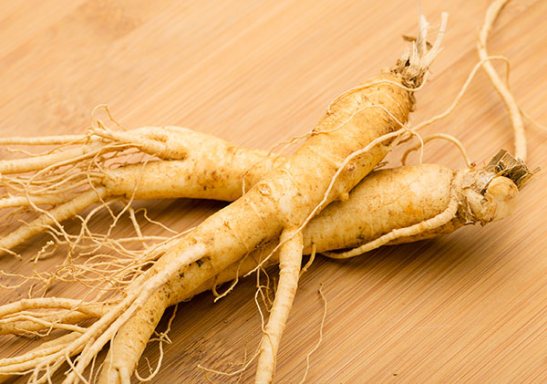
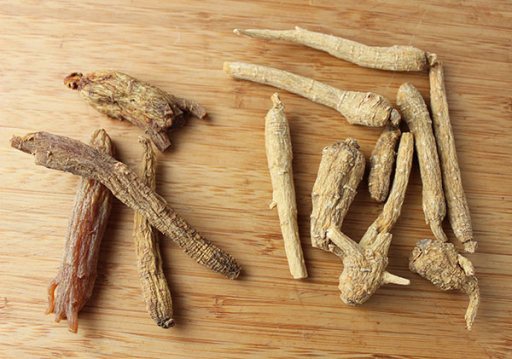
Fresh ginseng (left), dried ginseng (right)
Ginseng—There are two kinds of ginseng: the American Ginseng and the Asian Ginseng. American ginseng is produced in the United States and Canada, while Asian ginseng is cultivated mainly in China and South Korea.
American ginseng generates body fluids and is said to clear internal heat. It is usually considered a cooling and calming tonic. Those who can benefit most from American ginseng are individuals that are under stress, athletes, and people who feel hot and thirsty all the time. Such people may cough frequently, or even coughing up blood, which is an indication of internal heat according to traditional Chinese medicine.
Asian ginseng, on the contrary, has warming and drying properties. It is traditionally used to treat cold syndromes, which include cold limbs, weak pulse, exhaustion, and shortness of breath. It is also used to boost the immune system and to increase cognitive performance. Some preliminary medical studies suggest that Asian ginseng may improve the symptoms of heart disease in people. It may also decrease LDL (bad) cholesterol levels and raise HDL (good) cholesterol.
NOTE: Do not give ginseng to a child.
Rose—Rose tea is thought to be especially good for women. Chinese medicine believes that rose tea promote blood circulation, reduce menstruation pain, support heart functioning, eliminate fatigue, protect our liver and gastrointestinal system. In addition, it delivers calming, soothing and anti-depressant effects. Rose tea is also very high in vitamin C, making it a wonderful natural boost for our immune system, and good for our skin and hair.
The use of herbs is a time-honored approach to strengthen the body and to treat disease. However, like anything with medicinal properties, herbs can trigger side effects and interact with other herbs, supplements, or medications. For these reasons, we should consume herbal teas with care. It is best to drink them in moderation over a short period of time and to observe how our body responds to the teas. Ultimately, it is always wise to take herbs under the supervision of a health care provider qualified in the field of botanical medicine.

The information, including but not limited to, text, graphics, images and other material contained on this website are for informational purposes only. The purpose of this website is to promote broad consumer understanding and knowledge of various health topics related to tea (both real and herbal). It is not intended to be a substitute for professional medical advice, diagnosis or treatment. Always seek the advice of your physician or other qualified health care provider with any questions you may have regarding a medical condition and never disregard professional medical advice or delay in seeking it because of something you have read on this website.


